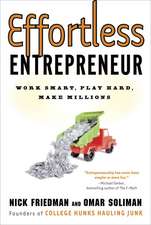Collective Knowledge: How Teams and Larger Social Systems Learn, Remember, and Invent: Innovation und Entrepreneurship
Autor Patrick Figgeen Limba Engleză Paperback – 23 mai 2018
Din seria Innovation und Entrepreneurship
-
 Preț: 383.93 lei
Preț: 383.93 lei - 15%
 Preț: 499.77 lei
Preț: 499.77 lei -
 Preț: 451.48 lei
Preț: 451.48 lei - 13%
 Preț: 375.00 lei
Preț: 375.00 lei - 13%
 Preț: 380.19 lei
Preț: 380.19 lei -
 Preț: 346.27 lei
Preț: 346.27 lei -
 Preț: 377.28 lei
Preț: 377.28 lei -
 Preț: 380.45 lei
Preț: 380.45 lei -
 Preț: 384.48 lei
Preț: 384.48 lei -
 Preț: 379.48 lei
Preț: 379.48 lei -
 Preț: 377.95 lei
Preț: 377.95 lei -
 Preț: 387.96 lei
Preț: 387.96 lei -
 Preț: 378.71 lei
Preț: 378.71 lei -
 Preț: 356.46 lei
Preț: 356.46 lei -
 Preț: 382.95 lei
Preț: 382.95 lei -
 Preț: 382.95 lei
Preț: 382.95 lei -
 Preț: 384.48 lei
Preț: 384.48 lei -
 Preț: 379.30 lei
Preț: 379.30 lei - 15%
 Preț: 635.96 lei
Preț: 635.96 lei - 15%
 Preț: 435.77 lei
Preț: 435.77 lei -
 Preț: 445.88 lei
Preț: 445.88 lei - 15%
 Preț: 441.19 lei
Preț: 441.19 lei -
 Preț: 358.19 lei
Preț: 358.19 lei - 13%
 Preț: 378.75 lei
Preț: 378.75 lei - 15%
 Preț: 439.38 lei
Preț: 439.38 lei -
 Preț: 408.92 lei
Preț: 408.92 lei -
 Preț: 401.43 lei
Preț: 401.43 lei -
 Preț: 352.28 lei
Preț: 352.28 lei -
 Preț: 355.37 lei
Preț: 355.37 lei -
 Preț: 343.86 lei
Preț: 343.86 lei -
 Preț: 383.12 lei
Preț: 383.12 lei -
 Preț: 381.43 lei
Preț: 381.43 lei -
 Preț: 379.86 lei
Preț: 379.86 lei -
 Preț: 382.75 lei
Preț: 382.75 lei - 15%
 Preț: 635.47 lei
Preț: 635.47 lei -
 Preț: 389.49 lei
Preț: 389.49 lei -
 Preț: 311.21 lei
Preț: 311.21 lei
Preț: 381.98 lei
Nou
Puncte Express: 573
Preț estimativ în valută:
73.10€ • 76.04$ • 60.35£
73.10€ • 76.04$ • 60.35£
Carte tipărită la comandă
Livrare economică 14-28 aprilie
Preluare comenzi: 021 569.72.76
Specificații
ISBN-13: 9783658221799
ISBN-10: 3658221798
Pagini: 183
Ilustrații: XVII, 183 p. 7 illus.
Dimensiuni: 148 x 210 mm
Greutate: 0.27 kg
Ediția:1st ed. 2018
Editura: Springer Fachmedien Wiesbaden
Colecția Springer Gabler
Seria Innovation und Entrepreneurship
Locul publicării:Wiesbaden, Germany
ISBN-10: 3658221798
Pagini: 183
Ilustrații: XVII, 183 p. 7 illus.
Dimensiuni: 148 x 210 mm
Greutate: 0.27 kg
Ediția:1st ed. 2018
Editura: Springer Fachmedien Wiesbaden
Colecția Springer Gabler
Seria Innovation und Entrepreneurship
Locul publicării:Wiesbaden, Germany
Cuprins
Determinants of technological novelty in inventor teams.- Influence of Founder-Inventors, individual and team experience.- Development of Transactive Memory Systems.- Impact of social exchange patterns, costs of reciprocity and organizational design.- Transactive Memory Systems in the ‘Digital Age’.
Notă biografică
Dr. Patrick Figge received his Ph.D. from the University of Passau where he continues his research on entrepreneurship, teams/groups, and the impact of digitalization.
Textul de pe ultima copertă
Collective knowledge and the associated concepts of collectively learning, remembering and inventing are increasingly important in today’s economy and society. Completing knowledge work alone is more and more difficult for individuals. Based on novel datasets which identify founders as inventors on patents and survey data collected from senior management, the author investigates questions about knowledge processing. What determines whether dispersed specialist knowledge can be located and used to complete tasks or to create new knowledge? How are social interactions organized and to what extent do individuals such as founders influence the course of action taken by the system as a whole?
Content
- Determinants of technological novelty in inventor teams
- Influence of Founder-Inventors, individual and team experience
- Development of Transactive Memory Systems
- Impact of social exchange patterns, costs of reciprocity and organizational design
- Transactive Memory Systems in the ‘Digital Age’
Target Groups
- Scientists, lecturers, and students in the areas of innovation and entrepreneurship, organization science, and strategy research
- Managers and practitioners in the fields of knowledge management, research & development, and digitalization
Dr. Patrick Figge received his Ph.D. from the University of Passau where he continues his research on entrepreneurship, teams/groups, and the impact of digitalization.
Caracteristici
A study on founders, teams, and collective knowledge in the age of digitalization
















